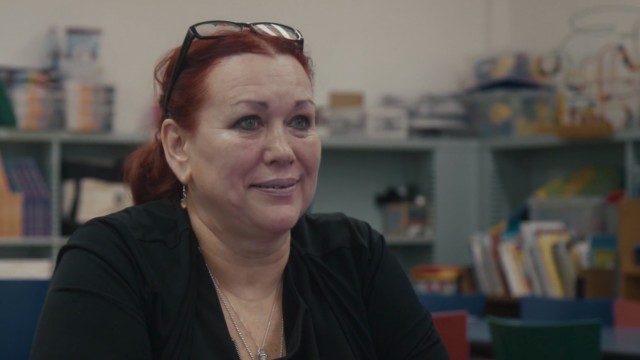In the aftermath of the pandemic, the words “video call” will probably strike fear in many that hear them. After spending countless hours in our home offices / kitchens / bedrooms talking to colleagues over whichever video communications platform was preferable, I’m sure a lot of us would be happy to never have another conversation via web cam again. However, there’s also a flip side to this opinion, as many still rely on this particular means of connection to talk to loved-ones and see their faces. Those separated by war, those having to leave their family to find work or those, like in Malika Zouhali-Worrall’s insightful and emotive short documentary Video Visit, separated by incarceration.
Centred around Brooklyn public library’s pilot programme to connect families to incarcerated relatives via free video calls (or “Televisits”), this 23-minute film does so much more than remind us of the benefits this technology can provide, as it presents an insight into the American prison system and those that have to navigate it. A complex, layered short, that allows us to understand the importance of this initiative from the perspective of an inmate’s family, while also allowing a glimpse into the politics behind running such an operation, this is compassionate and important filmmaking at its very best.

As a mother sees her son for the first time in a while over a Televisit, her face conveys so much emotion.
Introducing us to the Televisit system as we join a mother as she nervously waits to be connected with her son, who (at the time of filming) was imprisoned in New York City’s largest jail, Rikers Island, we get an instant indication of the role these video calls play in a family’s life. A notion that is further supported in a following sequence, as another mother reveals the arduous details – a train, a crowded bus full of anxious people, a number of demeaning security checks – of getting to the prison in person. Yet nothing really drives home the message of Video Visit more than it’s final scene, when the first mother is “reunited” with her son over a Televisit, after the programme had to temporary close after refusing to meet new demands from the Department of Corrections. The look on her face conveying so many emotions and leaving quite the impact.
In terms of production, there’s nothing really new or distinct about the filmmaking, with Zouhali-Worrall feeling as if she’s prioritising empathy and compassion over anything else. Largely employing an observational approach, interspersed with the odd voiceover or title card adding extra explanation, for me it’s the edit of Rabab Haj Yahya that really pulls the film together. Managing to present three different perspectives of the Televisit system without ever losing momentum, the short is perfectly-paced and fits so much into its brief run-time. As we cut from family to library admin, the film allows us an insight into the emotional investment in this scheme from all involved.
The politics behind the US prison system may be infuriating, but Video Visit reminds us of the real people impacted by it, making them more than just another statistic. Maybe more important than all of this though, is the sense of hope that emanates from the film. As we’re taken on an emotional journey with numerous ups and downs, although the end title cards provide a bit of a negative kicker, what sticks with you is the persistence and dedication of all the people we’ve encountered along the way. As long as there are people like this in the world, we might just be OK!

 Rob Munday
Rob Munday